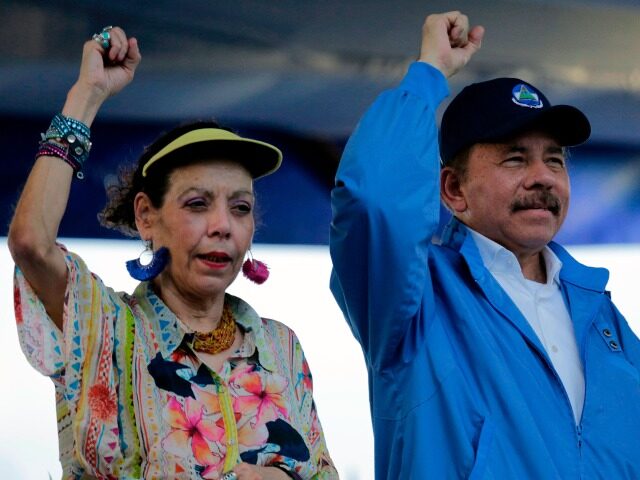The Nicaraguan communist regime has been funding itself with remittances sent home by Nicaraguans who it banished or forced to flee, turning them into a crucial economic resource, a report published by the Nicaraguan newspaper La Prensa on Friday revealed.
The report cites the director of the Migration, Remittances, and Development Program at the Inter-American Dialogue, Manuel Orozco, whose recent study found that remittances sent to Nicaragua are expected to total almost $5 billion by the end of this year, exceeding 30 percent of the nation’s Gross Domestic Product (GDP).
“Unfortunately, family remittances are economically oxygenating a regime that kills, imprisons, intimidates, and expels its citizens,” Orozco said.
“Without migration and family remittances, the other indicators are recessive; there is no private investment; there is little access to credit; there is no increase in consumption; [there are] informal labor increases.”
“Indebtedness and debt payments increase, taxes grow, but spending does not. Meanwhile, the regime continues to preserve its elite in power,” Orozco concluded.
The report found that about 725,000 Nicaraguans — approximately 11 percent of the nation’s roughly 6.8 million citizens — left their country between 2018 and 2023. The Ortega regime dramatically increased its brutal repression following the April 2018 protests, when thousands of Nicaraguans flocked to the streets, calling for freedom and the end of communism in their nation.
In February, the Ortega regime banished 222 political prisoners and dissidents to the United States, stripping them of their Nicaraguan citizenship and rendering them “stateless” persons.
Orozco points out in his study that the fundamental reasons for the continued exodus of Nicaraguans are fear, threats, and lack of economic opportunities without freedom.
WATCH: Migrant Woman Claims Fear of Nicaraguan Government
Randy Clark, Breitbart Texas“Two-thirds of Nicaraguans have a family member living abroad, and there are close to one million Nicaraguan households receiving remittances,” he stated.
The amount of remittance money sent to Nicaraguan citizens from abroad has exponentially increased in recent years — and has, in turn, come to represent a sizable portion of Nicaragua’s GDP.
According to information published by the Central Bank of Nicaragua in January, the country received $3.22 billion in remittances during 2022, a 50.2-percent increase from the $2.14 billion received in 2021.
About 77 percent of the remittances received in 2022 came from the United States. The $2.36 billion worth of U.S.-sent remittances was more than the $1.79 billion Nicaragua received from exports sent to the U.S.
One million Nicaraguan households are expected to receive the forecasted $5 billion worth of remittances by the end of 2023 — 33 percent of Nicaragua’s economy.
“In a short time, Nicaragua became the most remittance-dependent country in the Americas,” Orozco explains in his study:
The households that receive remittances are the ones that consume, the ones that pay daily for milk, bread, and the medicines that one needs. At least 800,000 Nicaraguans send their relatives an average of $350 per month if they are in the United States and $100 per month from Costa Rica and Panama.
Orozco determined in his study that Sandinista dictator Daniel Ortega and his wife, Rosario Murillo, have designed an economic method to safeguard the regime’s circle of power based on the stability of the external sector, austere state spending, investing only in its security apparatus, indebtedness, and increased tax collection without social investment.

Nicaraguan President Daniel Ortega speaks to supporters next to his wife and Vice President Rosario Murillo during a march on October 13, 2018. (INTI OCON/AFP via Getty Images)
Orozco explained:
The political system encourages the massive outflow of people to send remittances and takes advantage of the Free Trade Agreements with the United States and the European Union to generate economic activity in enclaves with few links to value chains in the interior, generating a minimum base of workers who earn wages and generate income taxes on employment, while violating the labor rights of these same workers.
La Prensa’s report stated that while remittances guarantee timid economic growth for the Ortega regime, only 20 percent of the families that receive remittances are able to save a few dollars from them, as the average monthly remittance of $100-$350 is not enough to cover basic food expenses, estimated at $527 a month as of the end of June.
“Those who do not receive family remittances have a harder time, and that is why they think about emigrating,” the study explained:
It is not surprising that, even in spite of the limited effect of the [Biden Administration’s] humanitarian parole and the U.S. immigration restrictions, the CID-Gallup survey of June 2023 showed that 35 percent of those consulted want to leave the country.
“The perversity of this reality is reflected in the fact that remittances went from contributing six percent of tax revenue in 2016 to 23 percent in 2023,” the study noted.
Orozco concluded his study by observing that Nicaraguans abroad are aware of how remittances aid the Sandinista regime’s ailing economy — but, for them, family comes first.
Nicaragua’s case mirrors the other two authoritarian regimes in the region, Cuba and Venezuela. In Cuba, the communist Castro regime has turned remittances sent to Cuban citizens into a significant source of its revenue, pocketing upwards of 74 percent of every United States dollar sent from abroad by 2020.
The administration of President Joe Biden reversed restrictions last year imposed by former President Donald Trump on remittances sent to Cuba that prevented the communist regime from enriching itself through them.
In the case of Venezuela under the socialist Maduro regime, remittances sent to the South American nation are expected to amount to $3 billion in 2023, or up to ten percent of the nation’s GDP.
Christian K. Caruzo is a Venezuelan writer and documents life under socialism. You can follow him on Twitter here.

COMMENTS
Please let us know if you're having issues with commenting.